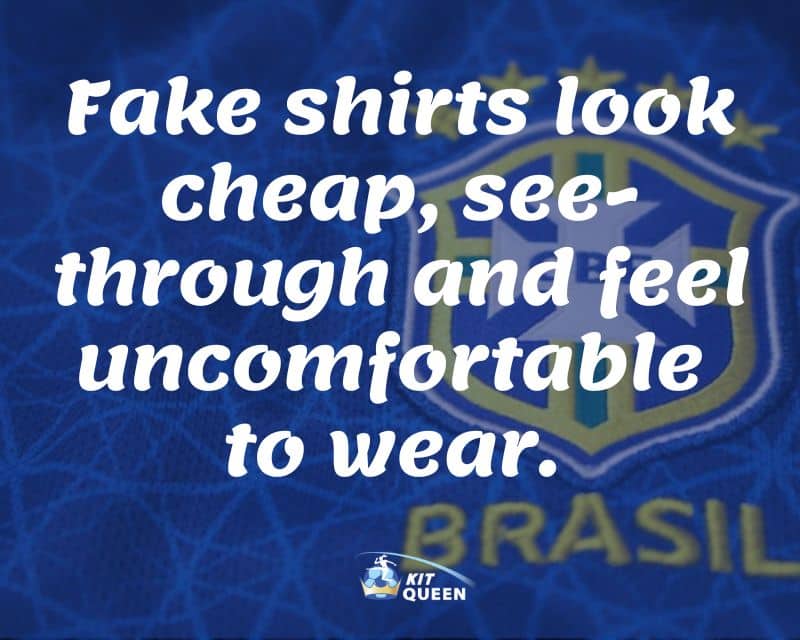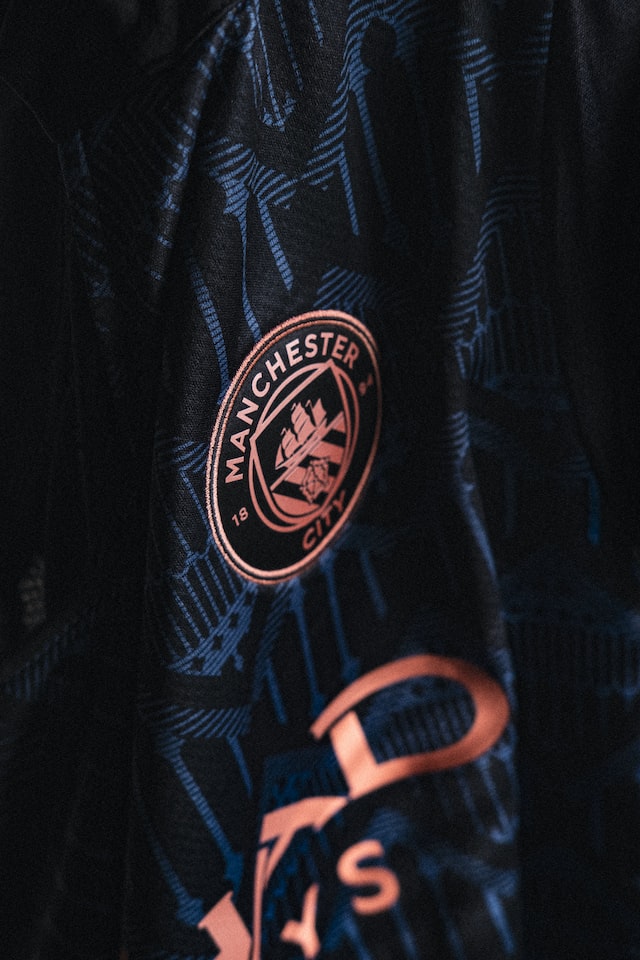It’s getting harder and harder to tell if a soccer jersey is the real deal.
With the rise of counterfeit goods, how can you be sure that the jersey you are buying is not a fake? Here are a few tips to help you find out how to tell if a soccer jersey is fake.
Table of Contents
- 1 How to tell if a soccer jersey is fake.
- 2 Watch and learn: How to spot a fake soccer jersey.
- 3 TOP TIP!
- 4 What is an authentic soccer jersey?
- 5 What’s the difference between a soccer jersey and authentic jersey?
- 6 Where is the product code on a soccer jersey?
- 7 What’s the difference between a soccer jersey and replica jersey?
- 8 Are fake soccer jerseys worth buying?
- 9 The final score.
- 10 This article was written by
How to tell if a soccer jersey is fake.
Here are our top tried and tested ways to find out whether your soccer jersey is the genuine article.
#1. Check the badges and logos.
This is usually where fake jerseys fail miserably. The badge should be embroidered or heat applied onto the jersey, not printed, and the stitching should be even and precise.
If the badge is misaligned or crooked, or they look blurry or cheap, it’s likely that they’re not authentic.
#2. Check the material of the jersey.
Knock-off jersey materials are often of poorer quality than authentic ones, so if the fabric feels cheap or flimsy, it’s likely that the jersey isn’t genuine.
Another clue can be found in the stitching; if it looks sloppy or uneven, chances are the jersey is fake.
Always check the care labels too. Genuine jerseys will have labels bearing the logo of the manufacturing company (often Adidas or Nike) as well as size information and washing instructions.
These labels should be sewn into the jersey near the bottom hem—if they’re ironed on or glued on, it’s another sign that you’re dealing with a fake.
#3. Examine the printing on the jersey.
Check the quality of the printing on the jersey. If there are any misspellings anywhere, then it is definitely not an authentic jersey.
Also, the printing should be smooth and even—if it looks wrinkled or raised, it’s not genuine.
If you’re looking at a player’s name and number on the back of the jersey, make sure that the print is in line with the seams (it shouldn’t be wonky or crooked). And take a close look at the lettering—if it’s fuzzy or unclear, it’s not authentic.
#4. Compare the price of the jersey with other sellers.
If the price seems too good to be true, then it probably is too good to be true!
Chances are that you are looking at a fake jersey if the price is significantly lower than what other sellers are asking for an authentic jersey.
When in doubt, always buy from a reputable seller, and make sure to do your research before making a purchase. A little bit of effort up front can save you a lot of money (and grief) down the road.
Watch and learn: How to spot a fake soccer jersey.
Here’s an awesome video that breaks down what to look for as well as what to look out for when buying your jersey.
TOP TIP!
Tilt the jersey towards a light source and examine the fabric closely. If you can see through the fabric, then it means that the fabric is very thin and most likely not authentic.
What is an authentic soccer jersey?
For the real soccer fan, an authentic jersey is a must-have. Not only does it show your support for your team, but it also shows that you’re serious about the game.
But what exactly makes a jersey authentic? It’s not just the logo or the name of the team. It’s also the fabric, the stitching, and the overall quality of the jersey. When you buy an authentic jersey, you’re getting a product that is made to last. And that’s something that every true fan can appreciate.
They are a badge of honor, a symbol of loyalty, and a source of pride. For many fans, an authentic soccer jersey is the only way to show their support for their team.
Authentic jerseys are made from high-quality materials and feature intricate details that are carefully crafted to represent the team’s colors and logo. They also usually have a unique serial number that can be used to track down the manufacturer.
Fake jerseys, on the other hand, often look cheap and feel uncomfortable to wear. So if you’re looking for an authentic soccer jersey, make sure to do your research before making your purchase.

What’s the difference between a soccer jersey and authentic jersey?
When it comes to soccer jerseys, there are two main types: replica and authentic.
Replica jerseys are designed to look like the real thing, but they’re usually made from cheaper materials and don’t always feature the same level of detail.
Authentic jerseys, on the other hand, are made to be identical to the ones worn by professional players.
Authentic jerseys usually have a more tailored fit than replicas. They’re usually more expensive, but they’re also built to last.
They also tend to be made from thicker fabric, which can help keep you warm during chilly games.
Finally, authentic jerseys often have small details that aren’t found on replicas, such as stitched lettering and player numbers.
So if you’re looking for a jersey that’s just for show, a replica will do the trick. But if you want something that looks and feels like the real thing, an authentic jersey is the way to go.
Where is the product code on a soccer jersey?
The product code on an authentic soccer jersey should be located on the care label (as mentioned above). If you can’t find it there, then it’s likely that the jersey is not genuine.
It is a 6 or 7 digit number that tells us when the jersey was made and which factory it was made in. The first 3 digits represent the week of production and the last 3 digits represent the year.
For example, if the product code is 123456, then the jersey was made in week 12 of year 345. If you’re ever in doubt about when your jersey was made, just check the product code!
What’s the difference between a soccer jersey and replica jersey?
There’s a big difference between a soccer jersey and replica jersey.
A soccer jersey is an official jersey that is worn by the players of a certain team during their matches.
Replica jerseys are unofficial jerseys that are sold to fans so they can show their support for their team. The main difference between the two lies in their purpose.
Football jerseys are made to be worn by players while playing the game, while replica jerseys are made for fans to wear while cheering on their team from the stands.
There are also some differences in design. Football jerseys usually have the badge of the team on the chest, while replica jerseys often have the name and number of a specific player.
Some replica jerseys also have sponsors’ logos on them, while soccer jerseys never do.
Ultimately, whether you’re wearing a soccer jersey or a replica jersey, showing your support for your team is what matters most. So go ahead and rock that jersey with pride.
Are fake soccer jerseys worth buying?
If your budget is tight, you may be considering purchasing a fake jersey instead of an official one. After all, they’re usually much cheaper and look just as good, right?
Wrong. While fake jerseys may save you some money in the short-term, they’re often made from lower-quality materials and are less durable than official jerseys.
Plus, they may not feature the correct badges or sponsorships, which can be a dead giveaway that you’re not supporting the real team.
Finally, you should be aware that buying a counterfeit soccer jersey may support illegal activity.
So if you want to show your true colors, it’s probably best to stick with an official jersey.
The final score.
In short, there are several ways to tell if a soccer jersey is fake. The main differences between an official soccer jersey and a replica jersey lie in their design and quality.
We hope we’ve helped you spot the fake jerseys so you can avoid them altogether.
And remember, if you’re looking for an authentic soccer jersey, make sure to do your research before making your purchase–that way you can be sure you’re getting the best possible deal.




